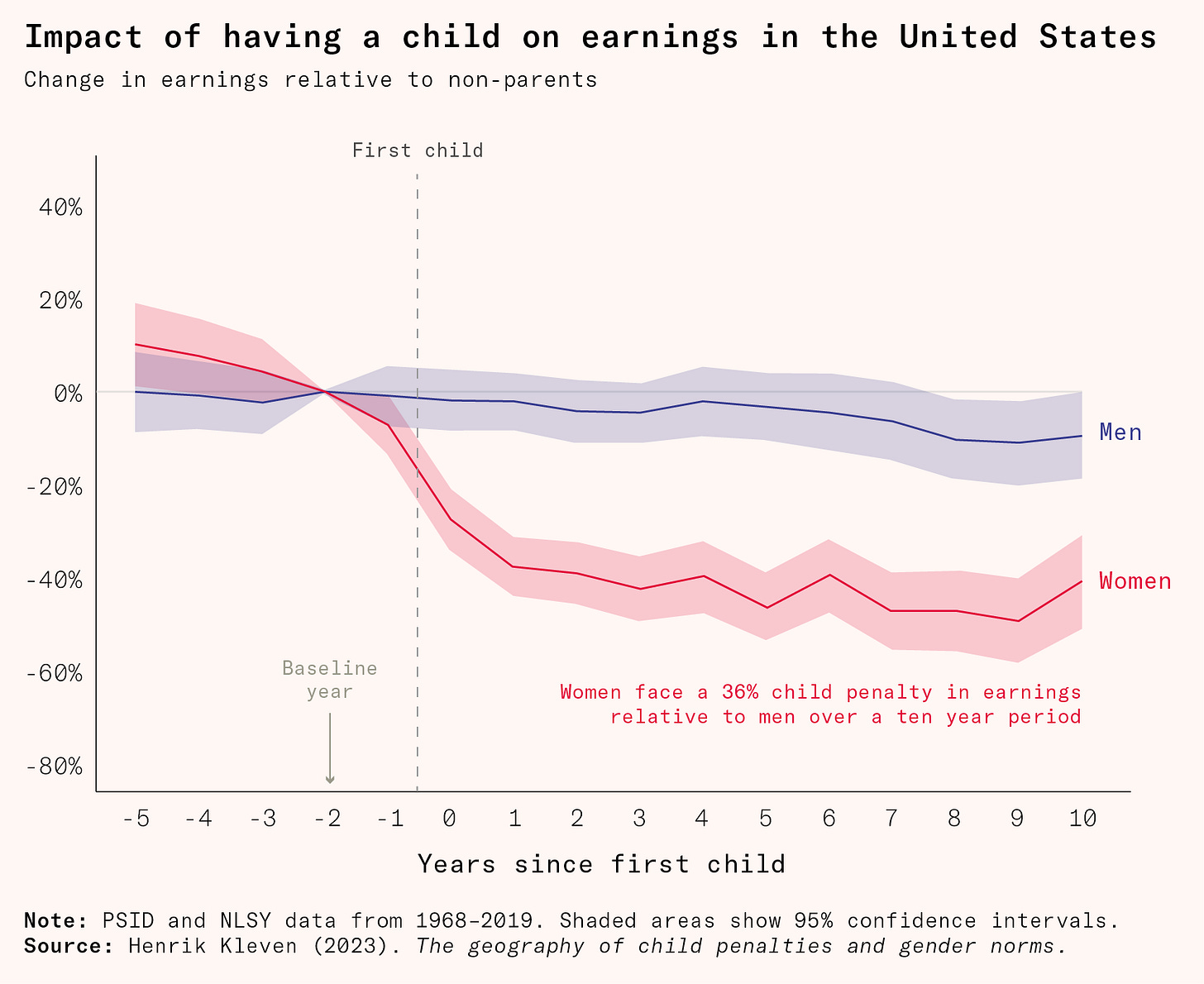Issue 18: Urbanism with Chinese characteristics
Plus: Reducing the motherhood penalty by extending fertility, the steam networks of New York City, and the rise and fall of the Hanseatic league.
Works in Progress Issue 18 is out today.
We also have articles on:
How technology can allow women to choose both careers and children;
Why Chinese and American apartment blocks look completely different (the secret is regulation);
What the Hansa can teach us about coalition building and breaking;
How the once-precious pineapple became an affordable supermarket item;
And, war and peace amongst hunter gatherers (and why psychopaths ruin it for everyone).

In 1882, Manhattan pioneered underground steam delivery, writes Jamie Rumbelow, creating what is now a 105-mile network that heats three quarters of the island's residential spaces. Steam solved problems as the city densified: coal-fired boilers wasted real estate and polluted the air. It also comes with downsides. Superheated vapor loses energy faster than modern district heating that uses water, plus faults in the system can lead to occasional explosions. But today’s steam network is a modern machine nothing like inventor Birdsill Holly’s initial creation.
Britain's early twentieth century experiment with land value taxation ended in failure, writes Samuel Watling. It may be why land value taxes remain largely theoretical today. Though championed by Henry George and embraced by the Liberal Party, the tax was a disaster. It cost four times more to administer than it collected in revenue, led to legal battles over valuations, and drove housing construction down two fifths in just three years. By 1922, the same politician who introduced the tax – David Lloyd George – was forced to repeal it. And the Liberal Party never led a British government again.
The pineapple was once Europe's ultimate status symbol, says Étienne Fortier-Dubois. Aristocrats spent fortunes on purpose-built ‘pineries’ to grow a single fruit for centuries after Columbus introduced them. But technological progress – steamships, refrigeration, and the Ginaca processing machine – transformed luxury into an everyday product.
China builds apartments as ‘towers in a park’, whereas when Americans build apartments, they favor mid-rise 5-over-1s. Despite the height of Chinese towers, the two building forms achieve nearly identical densities, explains Alfred Twu. The reason they do things so differently isn't cultural but regulatory. Culturally Chinese developers and apartment buyers in Taiwan, Macau, Malaysia, Singapore, and Hong Kong all prefer forms more similar to the American, and global, norm. But in China, building codes mandate apartment buildings to provide at least two hours of direct sunlight to their lowest floors on the coldest day of winter. A surprising number of urbanistic differences stem not from the cultural preferences of buyers but technical documents that can be changed with the stroke of a pen.
Hunter-gatherers weren't born killers, argue John Halstead and Philip Thomson. Prehistoric violent death rates were four times lower than previous estimates thought, making them only twice as homicidal as the most violent countries today. What makes humans dangerous isn't our proclivity for violence, but our capacity for efficient killing, and it is precisely this danger that drove humans to find ways to make peace with one another. Where violence did exist among hunter gatherers, it came from sociopathic individuals victimizing their fellow group members rather than endemic warfare. Only the advent of agriculture dramatically increased inter-group violence – by creating resources worth fighting over and hierarchies that allowed leaders to benefit from conflict.

After decades of slow but steady progress, the gender pay gap persists, largely because childbearing and childcare responsibilities fall disproportionately on women and disproportionately during their prime career-building years. As a woman's fertility declines, she faces an impossible choice, explains Ruxandra Teslo. We should look to new reproductive technologies as the next frontier in sexual equality and freedom. From egg freezing to in vitro maturation and stem cell-derived eggs, science is working to extend women's fertility windows and let them ‘have it all’.
Medieval merchants traveling across Northern Europe faced extraordinary dangers – from pirates to extortionate toll collectors. Their solution, writes Agree Ahmed, was to form coalitions. The biggest and best coalition was the Hanseatic League, formed by merchants from Germany’s trading cities. Despite no formal territory or central government, the League established trading posts from London to Russia, negotiated with kings, and occasionally won wars. The League built Northern Europe's first long-distance trade network and transformed regional crafts into proto-industries. But economic coalitions are inherently fragile. The Dutch built cheaper industries and undercut the Hansa, broke their embargoes, and permanently undermined their coalition.

More from Works in Progress
Far-UVC could revolutionize disease fighting, if we were willing to use it. Richard Williamson writes about how far-UVC eliminates 98.4 percent of airborne bacteria and a similar fraction of viruses (equivalent to 184 air changes per hour) yet languishes in obscurity due to regulatory gaps.
Tom Chivers reviews Charles Piller’s new book Doctored, on how fabricated data on the likely nonexistent ‘Aβ*56’ protein diverted researchers for 16 years, publication bias allowed deception to flourish, and decades of treatments failed.
M. Nolan Gray eulogizes Donald Shoup, whose groundbreaking work on parking economics spawned an international movement. Shoup showed how free parking costs billions in wasted time and distorted urban development, and proposed policy ideas that have been implemented in at least eight countries.
We launched a fellowship for writing on scientific progress together with Asimov Press, for which applications have just closed.
We published Links in Progress posts on everything from Greenland’s new airport, America’s finest new mid-rise building development, at Chevy Chase Lake, a breakthrough in developing a synthetic antivenom, housing shortages and fertility rates, and why access to contraceptives cannot explain falling fertility in Africa.
Housing supply: a syllabus
For a new site collecting reading lists that provide introductions to interesting subjects, Sam, Ben and John Myers (who wrote The Housing Theory of Everything together) put together a reading list about why housing supply matters and how to get more homes built. There’s a lot in there about urban economics as well as policy and mechanism design.
Saloni contributed a syllabus on improving clinical trials, and our friends Devon Zuegel and Henry Oliver contributed syllabi on cities and great English literature respectively.
New recruits
The Works in Progress team has grown since we last sent out a newsletter.
Pieter Garicano is our new managing editor, commissioning and editing articles for the magazine and making sure we keep up our quality standards.
Aria Babu has also joined the editing team. She’s also managing the creation of a new type of Works in Progress content. Stay tuned.
Alex Chalmers is working on building nuclear power quickly and cheaply, and providing the infrastructure the world needs for artificial intelligence.
Atalanta Arden-Miller will be WIP’s new art director, overseeing the new print magazine that is coming soon.
Samuel Hughes will be leading our work on building beautifully, and understanding what makes truly great cities.
And of course Sam Bowman, Rachel Edwards, Ben Southwood, Saloni Dattani and Virginia Postrel are all still knocking around, while Nick Whitaker is mostly working on other projects.
What we’ve been up to
Sam wrote for the Sunday Times on Labour’s growth plans, came up with 11 ways the UK government could boost growth quickly with policy, was interviewed by the 80,000 Hours podcast, was interviewed by The Atlantic, told the Adam Smith Institute why he was optimistic about Britain, and debated about economic growth at the Society of Professional Economists.
Ben has spent nearly all of this time looking after his two children under three. He found a little time to do jury service and wrote a thread about where new towns in the UK should be.
Saloni created lots of data visualizations about the baby boom, a period that most people have heard about but don’t know the details very well. She also wrote about the Golden Age of Antibiotics, a period of rapid antibiotic drug discovery in the mid-20th century, and how we might reignite more antibiotic development today.
Rachel visited Dublin for the BT Young Scientist & Technology Exhibition; planned parties in San Francisco, New York, and London celebrating the launch of Boom: Bubbles and the End of Stagnation; and shared her book recommendations in Eclectic Letters.
Pieter joined Works in Progress in February. Since then, he has edited from Washington DC and London. He has also written on Europe and growth for his blog, including on whether Spain is booming (not really), whether policy should target quantities or prices (prices usually) and why Europe doesn’t have trillion dollar companies (failure costs).
Aria bought a new kitten, finally chose a wedding dress and, of course, joined Works in Progress. Tonight, she’s debating the former CEO of Population Matters on whether falling birth rates are a good thing.
Alex joined Works in Progress in February to unleash a nuclear renaissance in the UK. He's also written for his blog on whether culture determines economic success, the need for more policy people to do nothing, and European defence. He's currently headed to the Emergent Ventures Unconference in Arlington.

Around the web
The story of declining birth rates is often told using total fertility rates. The problem is that they are a prediction of births per woman, not a measure – and the prediction is not always accurate.
Japan hasn’t been growing for decades. Yet thanks to abundant housing, high capital investment, and its orderly culture it is still a very nice place to live.
Why we ought to have red teams for regulators.
Second staircases are often mandated for fire safety reasons, raising costs and lowering construction. They don’t actually make us much safer.
Reviewing scientific papers internally, rather than externally, might be the easiest possible win to reform and improve academic science.
Politicians who push out misinformation tend to fool their own voters and supporters much more than they fool the other team.
There are more people alive in France who were born in 1946 than who were born in 2024.
Ireland is going to make it easy to build granny flats, or seomrai, in back gardens.
Weird research can feel extremely wasteful sometimes, but a surprising fraction of it is good.
How and why to let Cambridge grow to become the UK’s second-biggest city.
For Britain to grow, Heathrow must grow. And six things that critics of Heathrow expansion get wrong. Most plans for Heathrow expansion involve subsidies – because it is not allowed to sell the landing and takeoff slots that such an expansion will generate at their market price.
Beating antibiotic resistance means understanding peptides. Understanding peptides means keeping data on them. We need a million-peptide database!
Inference Magazine: a new journal on technological sovereignty, building datacentres, enabling nuclear power, frontier AI research, and much more.
Tyler Cowen, the man who wants to know everything (and is why Works in Progress exists).
We live like royalty and don’t even know it: how the background stuff in our life works.
Should we drop an 81-gigatonne atomic bomb below the seafloor to rapidly weather enormous amounts of basalt, sucking trillions of tonnes of carbon out of the atmosphere very quickly? Almost certainly.
Giving Brazilian couples housing makes them much more likely to have children.
Standard Ebooks takes old out-of-print classics and makes beautiful and readable ebook versions of them.
Happy reading!
– Sam, Ben, Saloni, Rachel, Alex, Aria and Pieter




